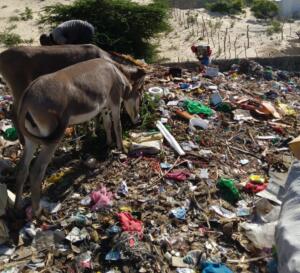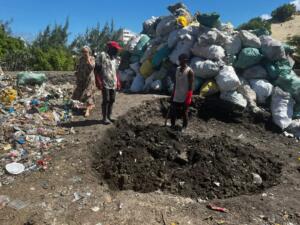Kijitoni Dumpsite REVAMP Final Report
The Kijitoni Dumpsite REVAMP began in May 2023 in partnership with Shela Environmental Residents Group (SERG) and Collective Sovereignty Community Based Organisation (CSCBO). The aim of the project was to upgrade the Shela Kijitoni dumping site on Lamu Island, into a waste sorting and resource recovery centre to address the increasing amounts of waste and make the dumpsite fit for purpose.
To do this, the groups had the mammoth task of clearing the dumpsite of decades of ash from waste that had been burnt on site and burying it nearby. This gives the SERG team space to sort dumped items ensuring as much as possible is recycled appropriately.


Overview of Activities
This project was ambitious in its activities and outcomes – unfortunately, not everything that they wanted to achieve was possible.
The first task was to clear decades of waste that had accumulated and been burnt. Over the years more burnt waste had accumulated on site raising the ground level to the height of the boundary walls. This posed many challenges in sorting as there was limited space and meant the ground was uneven and full of hazardous materials. Therefore, the groups had to devise a way to move all this waste – by hand.
This activity posed the largest challenge due to the inability to use diggers and excavators, so they had to rely on workforce alone, and this turned out to be a timely and costly way to move approximately 540 M3 of burnt waste –this included decades of disposable nappies that had accumulated in the ‘nappy corner’. This clearing was ongoing while 300kgs of new waste was brought to site daily and sorted waste was sent to local partners for recycling.
The huge task of clearing the site and then burying the debris meant the financial budget and timeline for this task was massively underestimated – in fact SERG raised a further KES (Kenyan Shillings) 250k to cover this activity and sought support from the Lamu County Government to finalise this task. Though, this underestimation meant that other planned activities had to be reassessed and reprioritised.
One of the key activities that was unable to progress was the tree planting – after all the work to clear and bury debris the teams didn’t have the budget to provide for tree planting. However, there are ongoing discussions to find the budget for this to go ahead as it is a key part of the detoxification of the soil and will provide natural shade for Kijitoni in the future.



Review of Outcomes
Through this project, the groups were able to clear the dumpsite to make way for more efficient sorting of waste. This will reduce landfill, put an end to open burning at the site and improve the health of those working at and living near the dumpsite.
Furthermore, SERG were able to make some vital improvements at the site to allow for further developments in the waste management infrastructure in Lamu. This included – fitting a gate to site to stop livestock from entering and eating unsafe waste; connecting water to improve the hygiene of staff members at site, and fixing the manual incinerator which to date is the safest way to dispose of waste that cannot be recycled in any way. Also, thanks to our support, SERG were able to secure funding to connect 3-phase power to the site to enable them to get small scale machinery in the future to further help them in managing waste.
Conclusion
While the groups were unable to complete the project as intended, there has still been positive outcomes from the activities undertaken. The groups learnt the importance of collaboration and clear communication to ensure the success of activities. Through this experience, the groups have become closer to enable them to manage the waste of Shela village more effectively.
This project also highlighted that waste management is not challenge that will disappear at any point in the future. This is an area that will need consistent investment and support to ensure that it’s ‘working,’ and that waste is not posing environmental and health risks.
Seeing how much waste is produced in a small village and how community groups have taken responsibility to clear it has reaffirmed LEF’s dedication to supporting waste management initiatives across the county. It is our intention to use lessons learnt from all communities to create a robust and effective countywide waste management policy.
